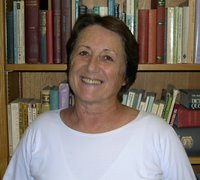Ethics and Diversity in the Public Sphere

One of our most popular podcasts to date has been the discussion about the ethics of diversity with Dr. Lani Roberts. People all around the world have emailed up to let us know how inspiring this conversation was to them. Dr. Roberts was recently interviewed in The Oregonian about a series of public lectures she gives on ethics all around the state of Oregon. These talks, organized by the Oregon Council of Humanities, are usually free to the public and meant to bring scholars out to the people. Dr. Roberts's most recent talk on ethics at the Corvallis Public Library was standing room only. Here is the article:
2,600 years, 4 moral systems
Ethics 101 - An OSU professor goes on the road with information on the commonality of people's morality -- and how it works
Saturday, July 08, 2006
NANCY HAUGHT
The Oregonian
From Lani Roberts' viewpoint, three things are true about most human beings the world over.
First, we're all trying to be the best people we can imagine ourselves to be. "No one sets out to be a lying cheater," she says.
Second, we're all tempted every day to do immoral things. "Otherwise, we wouldn't have so many moral rules," she says.
And, third, we all -- regardless of our time, place or culture -- make decisions about what is moral or immoral using the same four working theories. "It's been that way since pre-Socratic times, for about 2,600 years," she says.
"That's one of the things that's stunning about how alike we humans are."
That's the gist of Ethics 101, a presentation that Roberts, who has taught moral philosophy at Oregon State University for 17 years, has taken on the road as part of the state's 25-year-old Chautauqua program. Roberts has distilled a term of teaching on moral theory into about an hour of concise reflections, beginning with a chronological list of the theories and the problems that arise when we try to use them.
"The first one is divine command," she says. "Whatever God says, goes." Problems that arise in the use of this method include disagreements about whose god is doing the talking and what it is that the divinity demands, she says.
"Next is virtue ethics," she says. This theory dates from Aristotle's time and holds that virtues may be instilled in children so that they become habits when they are adults. "When you ask a child, 'What do you say?' and he says, 'Thank you,' you're teaching him gratitude," she says.
Traits such as generosity, honesty, kindness and courage -- "all the things we admire," she says -- may become part of a person's character. Then, when faced with a moral choice, he or she will make the right decision, Roberts says.
Problems arise in this method because, first, there isn't a corresponding virtue for every moral situation. Secondly, some virtues conflict with each other.
"If someone asks you, 'Do I look fat in this skirt?' kindness and honesty conflict with each other," she says.
The third moral method is absolutism, or deontology, she says. "You act in a particular way because it is your duty to do so. The act itself is moral or immoral, and there are no exceptions, period."
The commandment, "Thou shalt not kill," is a moral absolute, she says, but some morals may be debated. "There are people who believe that torture is never permissible," she says. "Others believe torture is, generally, not permissible, except in certain circumstances."
The "newest" moral method arose in the 19th century, Roberts says. It is utilitarianism, sometimes called consequentialism.
"Whatever act produces the greatest good for the greatest number is the moral act," she says. In World War II, this theory justified the bombing of Hiroshima or Nagasaki in Japan to precipitate a faster end to the war and spare more lives, she says. It's also the principle at work when Americans vote, she adds. We allow a majority of voters to decide what principles create the greatest good, and those principles become the law of the land.
That's the theory -- or theories -- anyway. Here are the challenges: Most of these theories have variations. And most people don't operate under one theory all the time, she says. We often start with what we see as the most stringent theory, and if it doesn't seem to "work," we gravitate toward more flexible ones, she says.
In her classes, and in her Chautauqua presentation, she asks students to practice using each of the four theories on hypothetical situations she has culled from Dear Abby columns and then reflect on the process.
The United Church of Christ in The Dalles hosted Roberts' Ethics 101 presentation in March. The Rev. Karl Vercouteren says people are still talking about what they learned about themselves and each other.
"We all find ourselves using various approaches from time to time," he says. It helps, sometimes, to know that we don't have to be "locked into one or the other" methods for making moral decisions.
Roberts says that helping people know themselves is the reason she teaches philosophy and offers Chautauqua presentations.
"Knowing ourselves is the whole point of our existence," she says. "If we are consciously aware of how we make decisions like this, we may be more open to alternative ways of thinking."
From Roberts' standpoint, the very process of making some moral decisions may involve making a conscious choice of which method to use.
"If there are no alternatives," she says, "then you can't be said to be freely doing anything."
Nancy Haught: 503-294-7625; nancyhaught@news.oregonian.com
Labels: diversity


0 Comments:
Post a Comment
Subscribe to Post Comments [Atom]
<< Home